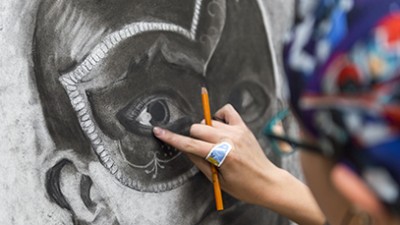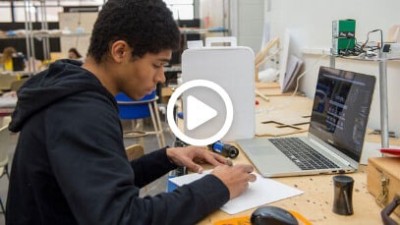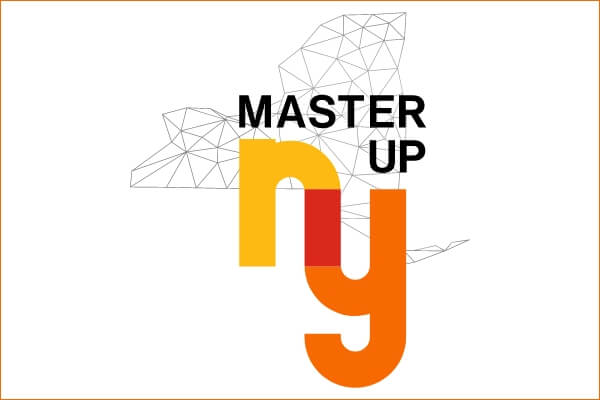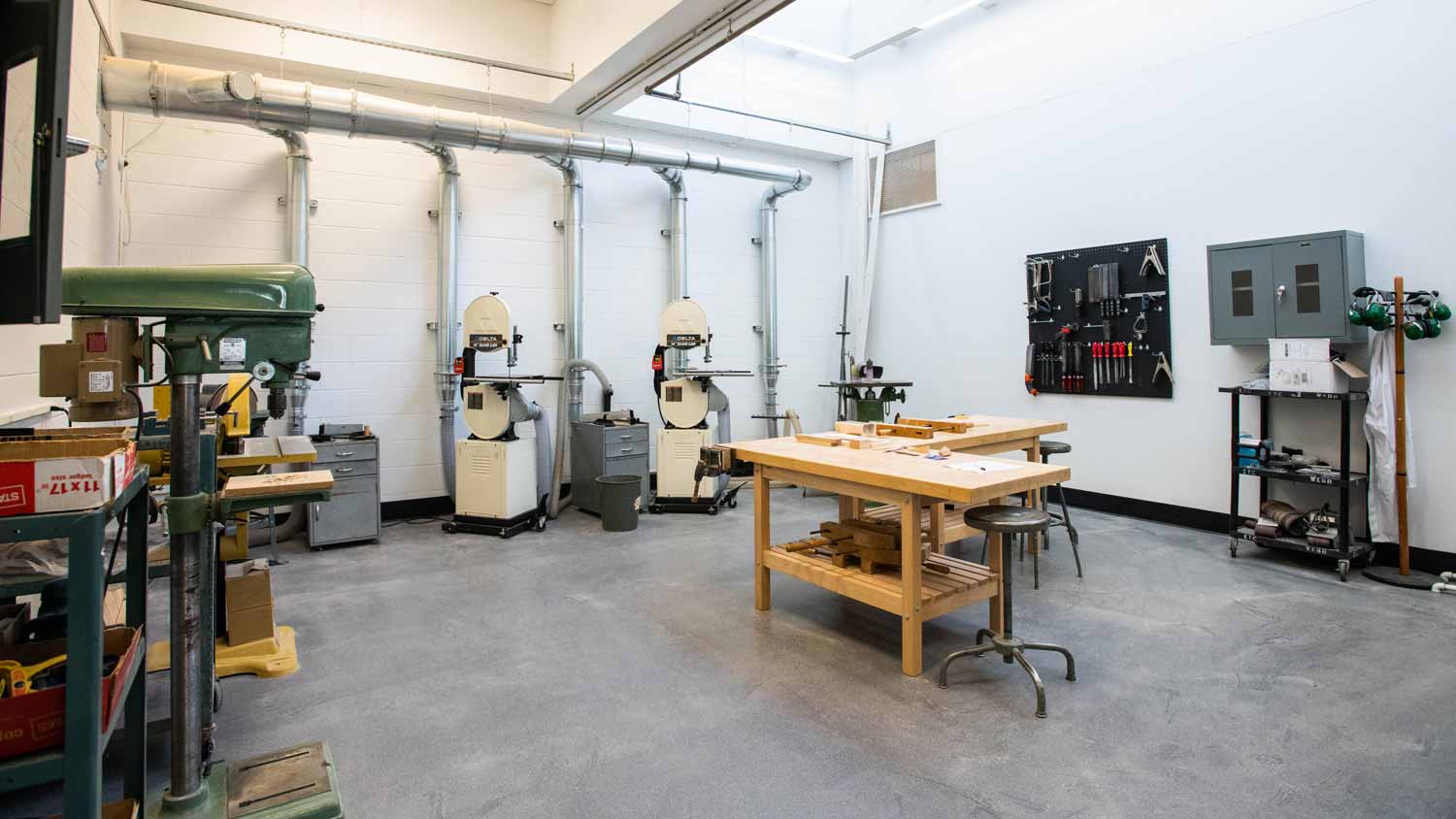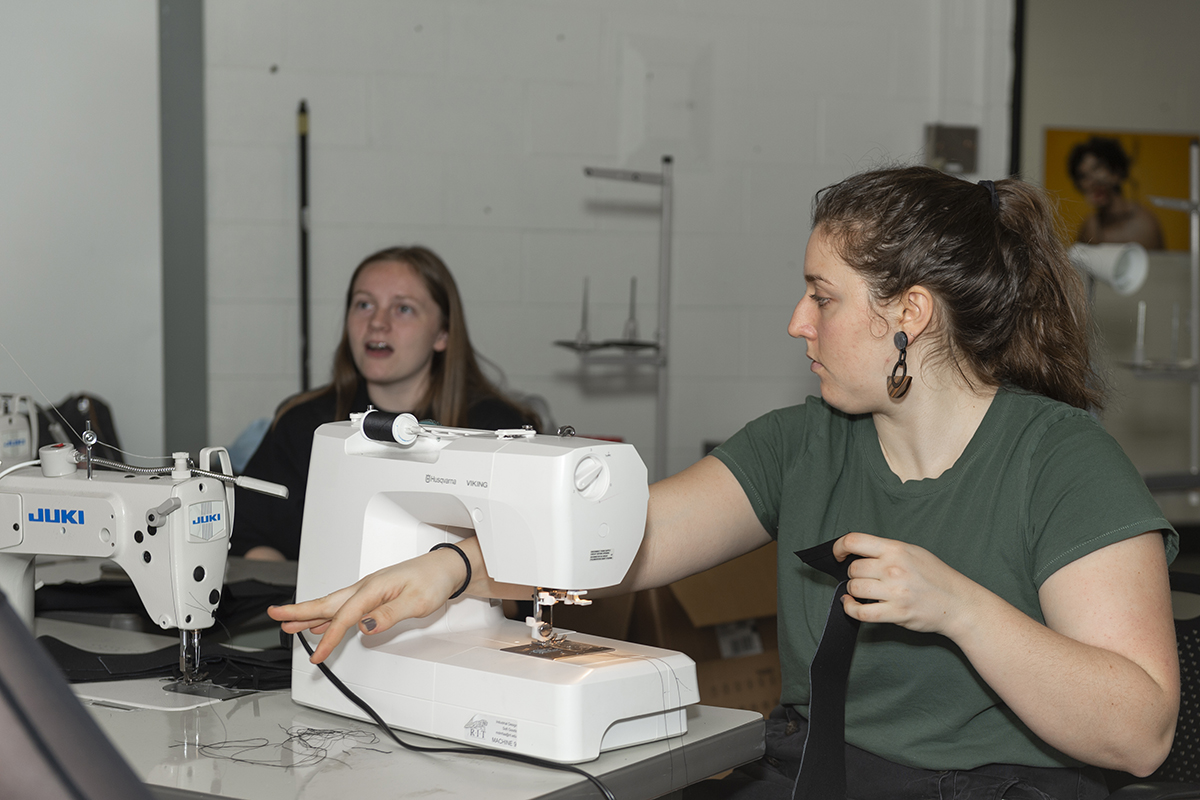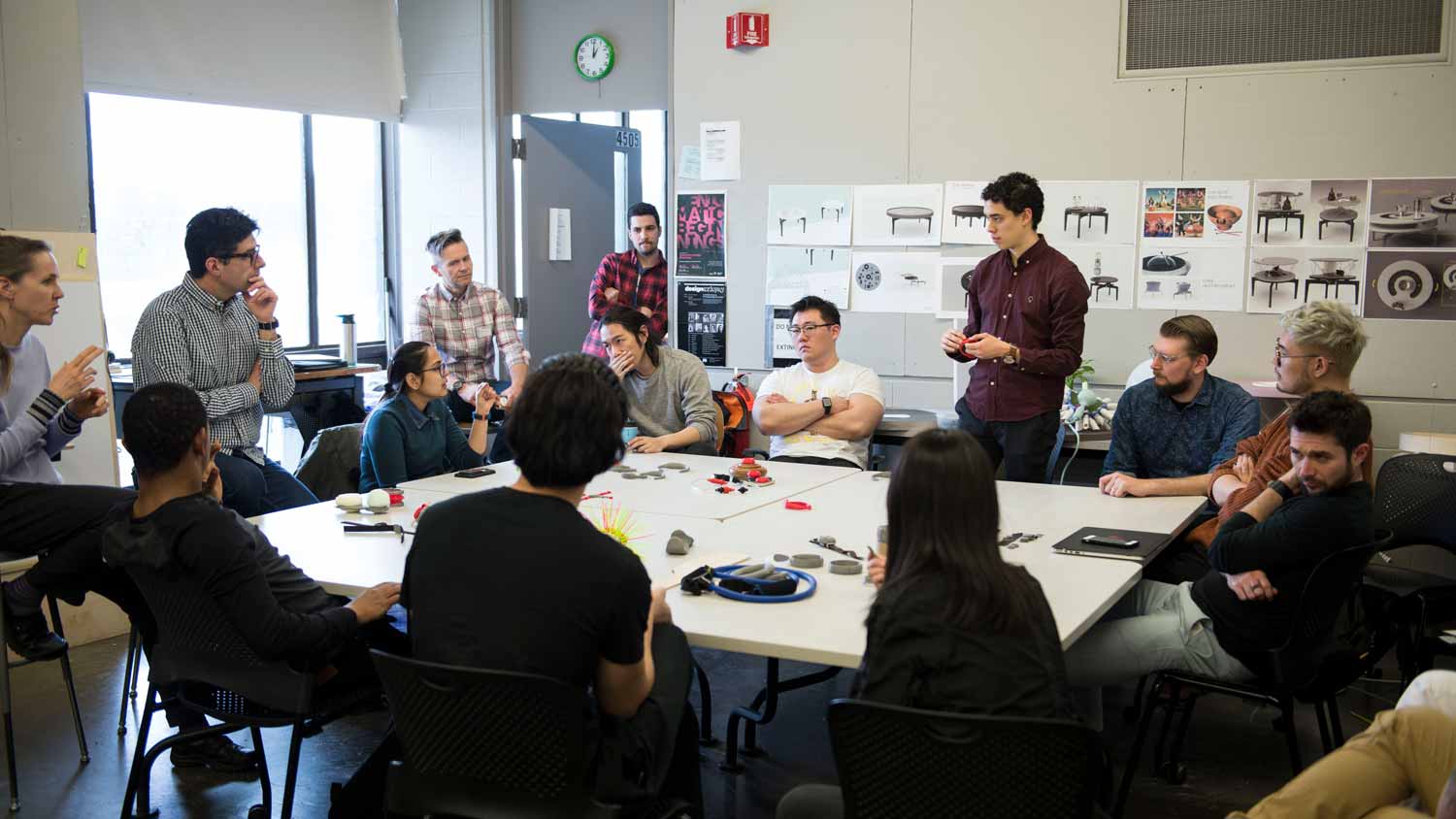Industrial Design Master of Fine Arts Degree
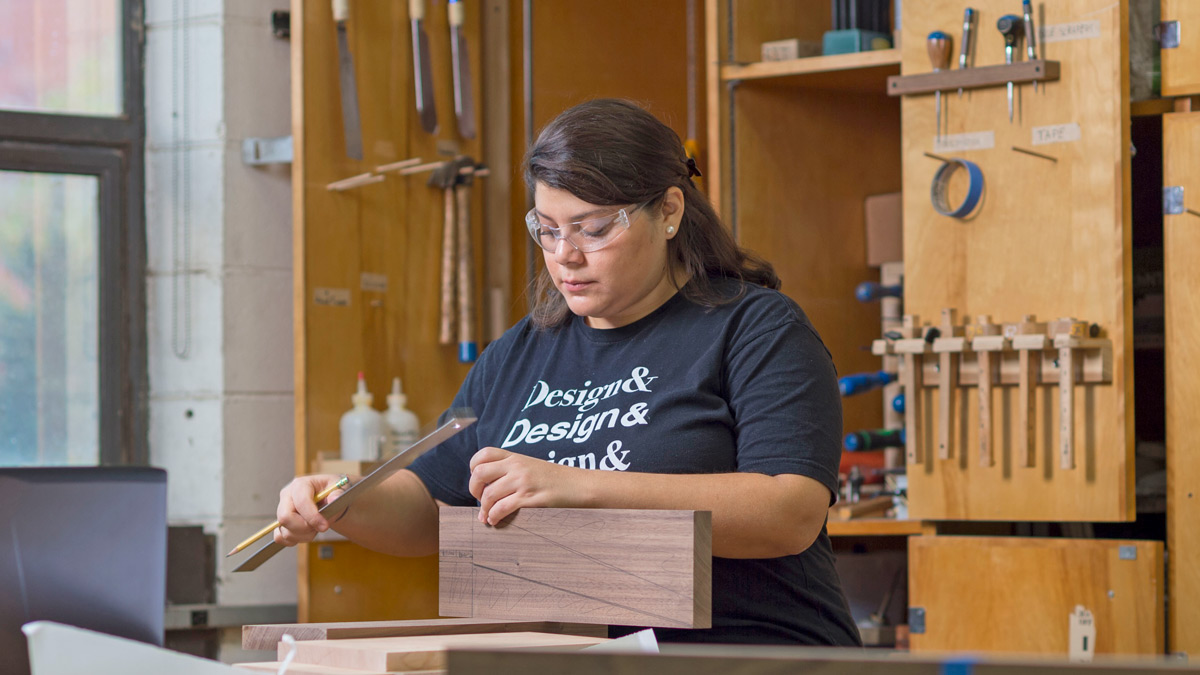
Industrial Design
Master of Fine Arts Degree
- RIT /
- College of Art and Design /
- Academics /
- Industrial Design MFA
Overview for Industrial Design MFA
Why Study RIT's MFA in Industrial Design
Project-Based Practice: Explore design theory, design history, and human-centered design; conduct unique research that furthers your understanding of the industry and society; and gain hands-on experience in technical competence, analytical thought, sustainability, and transdisciplinary collaboration.
A Hub for Design and Prototyping: Experienced the full capabilities of the seven makerspaces inside the SHED, RIT’s 209,000-square-foot facility that features an abundance of tech, resources, materials, and workspaces for prototype design and development and interactive design installations.
Develop In-Demand Skills: Learn design history and research, studio courses involve extensive design work with respect to sustainability, design process, the meaning of artifacts, and critical analysis. Engage with three-dimensional software for modeling and fabrication.
Collaborate and Create: Share labs, fabrication spaces, and studios spaces with graduate students from architecture, graphic design, integrative design, and more.
Form, function, and experience tell a story of considered design and the best possible outcome. The industrial design master's will enhance your career success by further developing your knowledge in design processes and technology. This project-based program allows you to explore design theory, design history, and human-centered design. You will conduct unique research on various topics of interest, which will further your understanding of the industry and society. As you conclude your studies, you will obtain hands-on experience in technical competence, analytical thought, sustainability, and transdisciplinary collaboration, all key to fueling your career.
RIT’s Master’s in Industrial Design
The industrial design MFA is for career enhancement or redirection. The educational experience is project-oriented, requiring research into design methods and technologies. Cross-disciplinary collaboratives provide an experiential dimension.
The first year of study includes seminar courses in design history and research, which are common to all graduate students in the School of Design. In addition, studio courses involve extensive design work with respect to sustainability, design process, the meaning of artifacts, and critical analysis. Additional course work using three-dimensional software for modeling and fabrication fills out the program.
In the second year students conduct research and develop a thesis project, which is presented in a graduate thesis exhibition or presentation, and is documented in a written thesis report.
-
Join us for Fall 2025
Many programs accept applications on a rolling, space-available basis.
-
Next Steps to Enroll
Accept your offer of admission and take the next steps toward becoming an RIT Tiger.
-
30% Tuition Scholarship for NY Residents and Graduates
Now is the perfect time to earn your Master’s degree. If you’re a New York state resident with a bachelor’s degree or have/will graduate from a college or university in New York state, you are eligible to receive a 30% tuition scholarship.
Careers and Experiential Learning
Typical Job Titles
| Industrial Designer | Product Designer |
Cooperative Education and Internships
What makes an RIT education exceptional? It’s the ability to complete relevant, hands-on career experience. At the graduate level, and paired with an advanced degree, cooperative education and internships give you the unparalleled credentials that truly set you apart. Learn more about graduate co-op and how it provides you with the career experience employers look for in their next top hires.
Co-ops and internships take your knowledge and turn it into know-how. Your art and design co-ops will provide hands-on experience that enables you to apply your artistic capabilities in dynamic professional settings while you make valuable connections between classwork and real-world applications.
Cooperative education, internships, and other experiential learning opportunities are encouraged for graduate students in the MFA in industrial design.
Creative Industry Days
Connect with Design Industry Leaders
RIT’s Office of Career Services and Cooperative Education hosts Creative Industry Days, which connects students majoring in art, design, film and animation, photography, and select computing majors with companies, organizations, creative agencies, design firms, and more. Creative Industry Days are a series of events that allow you to network with company representatives and interview directly for open co-op and full-time employment positions.
Featured Work and Profiles
-
Medical Device Designs
RIT students in the Industrial Design (BFA and MFA) and Graphic Design programs showcased the power of industry partnership as they worked with medical technology company Stryker to design home...
Read More about Medical Device Designs -
Pyaha
Andrea Gonzalez Traditional Paraguayan textiles were used to create a small tableware collection for typical dishes.
Read More about Pyaha -
Rectilinear Form
FDTN 131, 3D Design I Rectilinear Form: Balancing Dominant, Subdominant, and Subordinate Elements | This exercise asks students to concentrate on studying the subtle relationships between dominant, subdominant, and...
Read More about Rectilinear Form -
Industrial Design MFA Student Work Reel
Students in RIT's industrial design MFA program enhance future career success through further development of knowledge in innovative design processes and technology.
Read More about Industrial Design MFA Student Work Reel -
Think Space: Past Forward Competition
Marissa Tirone
Read More about Think Space: Past Forward Competition -
By The City / For The City Competition
Marissa Tirone
Read More about By The City / For The City Competition
Curriculum for 2024-2025 for Industrial Design MFA
Current Students: See Curriculum Requirements
Industrial Design, MFA degree, typical course sequence
| Course | Sem. Cr. Hrs. | |
|---|---|---|
| First Year | ||
| IDDE-607 | Technology Studio |
3 |
This course explores the use of computer-aided design (CAD) and other related technologies as tools for designing, modeling, visualizing, simulating and fabricating design solutions. Emphasis is given to the combination of digital and analog technologies, and the workflows for using them effectively in design process. (This class is restricted to degree-seeking graduate students or those with permission from instructor.) Studio 6 (Fall, Spring). | ||
| IDDE-701 | Design Laboratory I |
3 |
Design Laboratory I is part one of a studio sequence that provides a forum for discourse and experimentation in design. Critical analysis, contextual relevance and research methodologies are developed and used as a means to define the role of design and the designer in creating consequential solutions for the social, economical and environmental betterment of the global communities. Projects will extend these ideas into the practice of industrial design as a mode of understanding the relationships that exist between the user, the community and the designed artifacts. Opportunities for inter and trans-disciplinary collaborations will broaden the scope of the projects. We will design through a process of iteration and reiteration, empathic exploration, and the development of the physical artifacts. Categories of products may include: consumer goods, equipment, transportation, furniture, or packaging. (This course is restricted to students in IDDE-MFA.) Lab 3, Lecture 2 (Fall). | ||
| IDDE-702 | Design Laboratory II |
3 |
This course is the second of a two-course studio sequence that provides a forum for discourse and experimentation in design. Course continues the methodology established in Design Laboratory I, and extends the scope to human-centered concepts, artifacts and systems at both local and global levels. Assignments will include topics such as: responsible design practices, universal design, environmental sensibility, project management and fabrication. (Prerequisites: IDDE-701 or equivalent course and a student in the IDDE-MFA program.) Lab 3, Lecture 2 (Spring). | ||
| IDDE-703 | Function of Form |
3 |
The first of a two-semester sequence, this course emphasizes the experience of seeing, developing, and manipulating three-dimensional forms and compositions. Projects focus on developing the ability to see, organize, and understand the ambiguity inherent in the design process through the study of three-dimension design elements, the analysis of their relationships and the subsequent sensory responses. (This course is restricted to students in IDDE-MFA.) Studio 6 (Fall). | ||
| IDDE-704 | Form of Function |
3 |
The second of a two-semester sequence, this course emphasizes the technical skills necessary to manipulate material and data for the accurate three-dimensional communication of design intent. Projects focus on understanding the relationship of materials, manufacturing processes, products and the user. (Prerequisites: IDDE-703 or equivalent course and a student in the IDDE-MFA program.) Studio 6 (Spring). | ||
| IDDE-705 | 2D Ideation and Visualization |
3 |
The first of a two-semester visualization sequence, this course focuses on developing the skills and methods necessary to generate, visualize and define design concepts in two-dimensions, in both analog and digital formats. Assignments may include orthogonal views, perspective drawings and descriptive illustrations, as means to develop and communicate design solutions. (This course is restricted to students in IDDE-MFA.) Studio 6 (Fall). | ||
| IDDE-706 | Integrated Design Visualization |
3 |
The second of a two-semester visualization sequence, this course further develops analog and digital visualization techniques, while expanding on graphic and three-dimensional components needed to create effective presentations and the workflows to achieve them. Assignments will also include crafting visual and verbal presentations that synthesize the concepts developed. (Prerequisite: IDDE-705 or equivalent course.) Studio 6 (Spring). | ||
| IDDE-710 | Industrial Design History, Theory and Culture |
3 |
This course explores key moments in industrial design’s evolution from multiple angles: historical, theoretical, technological and cultural. While the emphasis is on industrial design, other integral design disciplines (i.e. visual communication, UX, systems, service, etc.) will be discussed. This combination of perspectives provides deeper understanding of how design addresses needs and wants of society, commerce, and environment beyond euro-centric contexts. Students are expected to read seminal design articles, write critical essays and questions and to participate in discussion groups. (This course is restricted to students in IDDE-MFA.) Lecture 3 (Fall or Spring). | ||
| IDDE-711 | Design Research and Proposals |
3 |
This course focuses on developing research skills in the field of design. Emphasis is placed on an exposure to a wide range of methods, research sources, data collection, and evaluation. Students will select and plan a design research topic, conduct a search for background material, construct a proposal, and defend their research topic. (This course is restricted to students in the VISCOM-MFA, GRDE-MFA, CMGD-MFA and IDDE-MFA majors and other CIAS and RIT graduate students with permission of instructor.) Lecture 3 (Spring). | ||
Open Elective |
3 | |
| Second Year | ||
| IDDE-671 | Graduate ID Studio I |
3 |
This is the first part of a two-course series that provides opportunities for fine-tuning of design process and development of meaningful solutions across multiple scenarios. Projects and assignments will explore the application of design methods and skills. Projects will also address large-community and global problems requiring team-based, trans-disciplinary collaborations. (This course is restricted to students in IDDE-MFA.) Studio 6 (Fall). | ||
| IDDE-672 | Graduate ID Studio II |
3 |
This is the second part of a two-course series that provides opportunities for fine tuning of design process and development of meaningful solutions across multiple scenarios. Projects and assignments will expand on the application of design methods and collaboration. Course content will integrate current and emerging technologies that influence design practice as well as society and culture. A strong focus will be on the testing and implementation of design solutions in effective ways. (This course is restricted to students in IDDE-MFA.) Studio 6 (Spring). | ||
| IDDE-790 | Thesis: Research and Planning |
6 |
The first of a two-course thesis sequence, the focus of this course is on establishing content, planning, scheduling, and research seeking innovative solutions through the process of concept development, ideation, and in-process evaluation. Final articulation of the project is approved by a faculty committee, presented in a graduate thesis show and accompanied by a written document that addresses how the theories and methods used in the project impact the current and future state of design in society. (Enrollment in this course requires permission from the department offering the course.) Thesis (Fall). | ||
| IDDE-890 | Thesis: Implementation and Evaluation |
6 |
The second of a two-course thesis sequence, this course focuses on continued concept development of a thesis, concluding with the implementation and retrospective evaluation of chosen design problem. Solution is presented in a public exhibition, complemented by a written articulation of how the theories and methods employed in the project impact the current and future state of design in society. (Prerequisite: IDDE-790 or equivalent course.) Thesis 9 (Spring). | ||
Open Electives |
9 | |
Art History Elective* |
3 | |
| Total Semester Credit Hours | 60 |
|
* Art History Elective refers to any graduate level non-studio course searchable in SIS with the Art History attribute of ARTH.
Admissions and Financial Aid
This program is available on-campus only.
| Offered | Admit Term(s) | Application Deadline | STEM Designated |
|---|---|---|---|
| Full‑time | Fall | February 1 priority deadline, rolling thereafter | No |
| Part‑time | Fall | Rolling | No |
Full-time study is 9+ semester credit hours. Part-time study is 1‑8 semester credit hours. International students requiring a visa to study at the RIT Rochester campus must study full‑time.
Application Details
To be considered for admission to the Industrial Design MFA program, candidates must fulfill the following requirements:
- Complete an online graduate application.
- Submit copies of official transcript(s) (in English) of all previously completed undergraduate and graduate course work, including any transfer credit earned.
- Hold a baccalaureate degree (or US equivalent) from an accredited university or college. A minimum cumulative GPA of 3.0 (or equivalent) is recommended.
- Submit a current resume or curriculum vitae.
- Submit a personal statement of educational objectives.
- Submit two letters of recommendation.
- Entrance exam requirements: None
- Submit a portfolio. View portfolio requirements.
- Submit English language test scores (TOEFL, IELTS, PTE Academic), if required. Details are below.
English Language Test Scores
International applicants whose native language is not English must submit one of the following official English language test scores. Some international applicants may be considered for an English test requirement waiver.
| TOEFL | IELTS | PTE Academic |
|---|---|---|
| 88 | 6.5 | 60 |
International students below the minimum requirement may be considered for conditional admission. Deaf and hard-of-hearing test takers with significant hearing loss do not need to take the listening and speaking sections for the TOEFL and IELTS. Each program requires balanced sub-scores when determining an applicant’s need for additional English language courses.
How to Apply Start or Manage Your Application
Cost and Financial Aid
An RIT graduate degree is an investment with lifelong returns. Graduate tuition varies by degree, the number of credits taken per semester, and delivery method. View the general cost of attendance or estimate the cost of your graduate degree.
A combination of sources can help fund your graduate degree. Learn how to fund your degree
Related News
-
January 27, 2025

Behavior meets brilliance: Dean emerita retires with enduring impact on design research
Lorraine Justice's career journey was filled with leading, learning, and designing what's next. True to her innovative spirit, she plans to remain busy in her retirement from RIT by exploring AI's role in design and creativity.
-
December 10, 2024

Metaproject 15 produces innovative furniture solutions for Icon Design and ARBR Studios
Metaproject is an annual design initiative that pairs students with industry partners to develop products consistent with the Vignelli “Design is One” philosophy.” Students collaborate with new partners and the results are showcased in a global venue.
-
October 10, 2024

Venice Art Biennial showcases RIT's extensive creative community
Six faculty are featured in an exhibition in Venice that showcases the College of Art and Design's breadth of creative disciplines through the unification of sculpture, film, photography, and industrial design.
Contact
- Delaney Ball
- Assistant Director
- Office of Graduate and Part-Time Enrollment Services
- Enrollment Management
- 585‑475‑6933
- Delaney.Ball@rit.edu
- Stan Rickel
- Associate Professor
- School of Design
- College of Art and Design
- 585‑475‑4745
- srrfaa@rit.edu
School of Design


